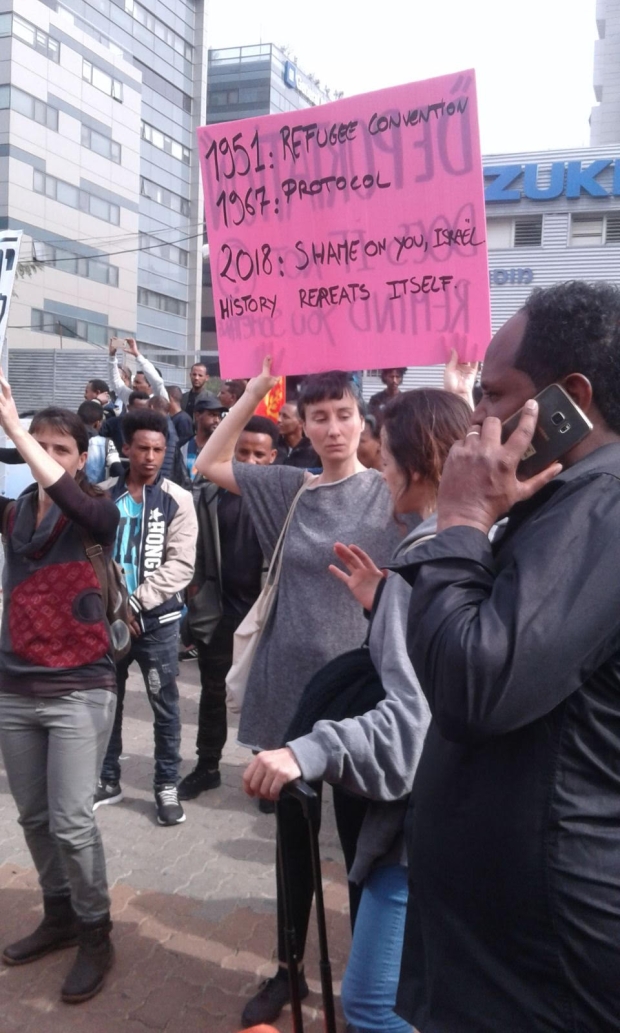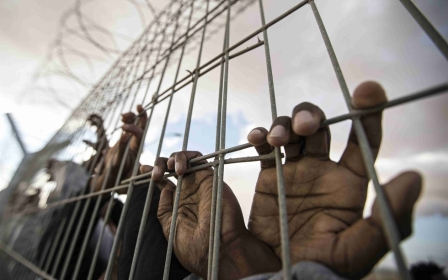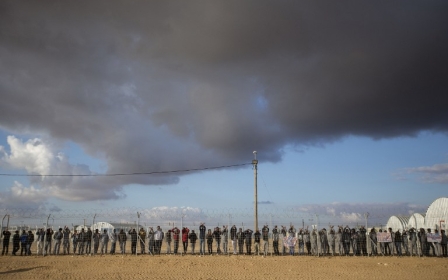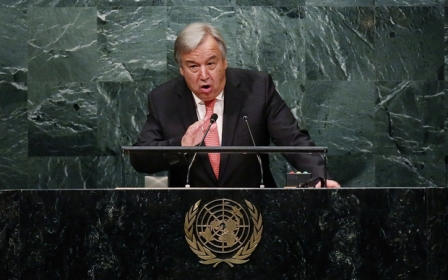African migrants in Israel opt for jail over deportation
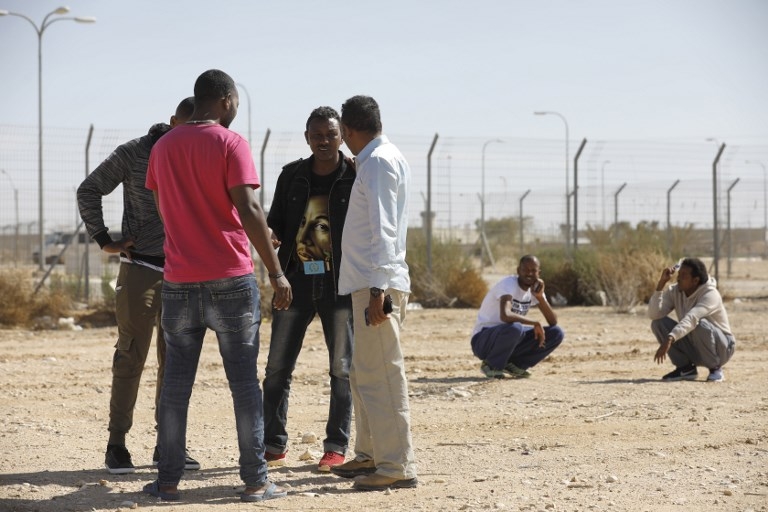
At a detention centre in Israel's Negev desert, African migrants facing deportation say they would rather be imprisoned than sent to a country they know nothing about.
"I won't go there," Abda Ishmael, a 28-year-old Eritrean, said in excellent Hebrew outside Holot, an open facility housing some 1,200 migrants and set to be shut down on 1 April as part of the government's expulsion policy.
"Guys who were here and went to Rwanda and Uganda - we saw what happened to them."
Israel is working to expel thousands of Eritreans and Sudanese who entered illegally over the years, giving them an ultimatum: leave by 1 April or risk being imprisoned indefinitely.
As the migrants could face danger or imprisonment if returned to their homelands, Israel is offering to relocate them to an unnamed third country, which aid workers say is Rwanda or Uganda.
Those who choose to leave by the end of March are being offered a cash incentive of $3,500.
The plan has drawn criticism from the United Nations' refugee agency as well as some in Israel, including Holocaust survivors who say the country has a special duty to protect migrants.
Eritreans at Holot say Rwanda and Uganda hold no prospects for them, and they'd rather be imprisoned in Israel than embark on another journey into the unknown.
'Just seeking asylum'
Ishmael, who reached Israel in 2011 after a terrifying journey from Eritrea, has heard about the fates of others sent to Rwanda or Uganda.
He said they have faced hardships in their new homes and gone on to take dangerous routes to Europe in hope of winning refugee status.
He vowed he would not voluntarily step back into the unknown.
"We know of people who were killed by (the Islamic State group), who were killed on their way to Libya, who starved and died of thirst in the desert," he said.
"These people were just seeking asylum."
To Shishay Tewelde Medihin, 24, Rwanda and Uganda are "death countries" and Israel is "risking my life".
He slammed an aid package Israel is reportedly planning to offer African countries in return for absorbing the migrants.
Tewelde Medihin said he planned to stay "indefinitely" in Saharonim prison, where migrants are expected to be sent if they refuse to leave.
According to interior ministry figures, there are currently some 42,000 African migrants in Israel, half of them children, women or men with families, who are not facing the April deportation deadline.
Israeli officials stress that no one they classify as a refugee or asylum seeker will be deported.
But out of some 15,400 asylum requests filed, 6,600 have been processed and just 11 have received positive answers.
Another 1,000 Sudanese from Darfur have received special status preventing their deportation.
Other men whose requests have been denied could face deportation.
Migrants began entering Israel through what was then a porous Egyptian border in 2007. The border has since been strengthened, all but ending illegal crossings.
Many migrants ended up in southern Tel Aviv, where they found work as dishwashers and cooks. But their growing community angered some Israelis.
Protests
Meanwhile, thousands of Eritrean and Sudanese refugees gathered in front of Rwanda’s Embassy in Herzliya to protest the expulsion, and condemn Rwanda for accepting money for their exile.
Although Rwanda’s ambassador, Olivier Nduhungirehe, has denied ongoing reports that his government made a secret deal with Israel to accept forcefully deported migrants at $5,000 per person, the arrangement is widely believed to be a foregone conclusion.
Amid chants of “We are refugees – we are not criminals!” and “Rwanda: Shame on you!” the protesters expressed fear of being forced to leave Israel to a country known for its autocratic regime and human rights violations.
“Don’t sell me to Rwanda,” pleaded Simon Gooka, 23, who came to Israel from South Sudan in 2012. “Please give us the honour of not calling us criminals. We are refugees who came to Israel for protection.”
Holding a sign stating “deportation kills,” Emmanuel Hopta, 30, who came to Israel from Eritrea in 2011, expressed shock at the government’s draconian stance.
“I came here because Israel signed the 1951 Geneva Convention for refugees and I thought they would protect me,” he told the Jerusalem Post.
'Infiltrators'
Religious and conservative politicians have portrayed the presence of Muslim and Christian Africans as a threat to Israel's Jewish character.
Calling them "infiltrators," Prime Minister Benjamin Netanyahu has repeatedly called for their expulsion.
Rights groups have rallied to the migrants' cause, saying they should be recognised in Israel as refugees and arguing they will face grave dangers if they are deported.
Others argue that conditions in Rwanda and Uganda are acceptable and it is not Israel's duty to care for them.
"I'll ensure all the rights we promised them, and at the same time, I'll rehabilitate south Tel Aviv," Interior Minister Arye Deri said.
The migrants located at Holot are allowed to leave during the day.
Waiting for a bus outside the facility, a defiant Ahmad Jamal, 25, said the government's plan was a ploy by Netanyahu to divert attention from corruption probes.
"We're wise to his tricks," he said bitterly.
Ishmael asked how he could be considered an economic migrant if he cannot be deported to his country of origin because of the dangers there.
"If the government really thinks I infiltrated to become a work migrant, it should have returned me to my country of origin," he said.
Both Ishmael and Tewelde Medihin miss their home country, but say they had no choice but to flee what they describe as a dictatorship.
"If things were better there, I wouldn't stay another minute here. I miss my country, my mother, my people," Tewelde Medihin said. "I didn't want to be a refugee."
Like the other Eritreans at the centre, Jamal's route to Israel involved an arduous trek through African countries and the Sinai desert, where he and his peers were at the mercy of Bedouin smugglers.
He also said he would refuse a cash payoff and hope for the best.
"God will watch over me, nobody else does," he said. "We're not afraid of anything. We've been through much worse."
New MEE newsletter: Jerusalem Dispatch
Sign up to get the latest insights and analysis on Israel-Palestine, alongside Turkey Unpacked and other MEE newsletters
Middle East Eye delivers independent and unrivalled coverage and analysis of the Middle East, North Africa and beyond. To learn more about republishing this content and the associated fees, please fill out this form. More about MEE can be found here.


